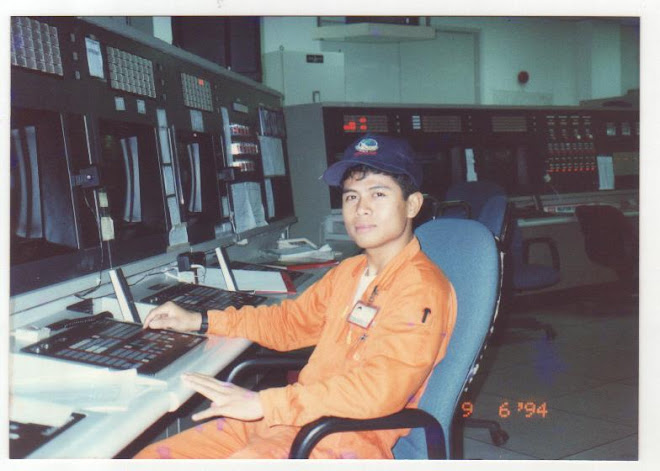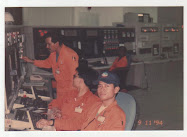
Buildings under construction are reflected in Dubai’s Marina area. Dubai property developers have cut jobs as the global financial crisis tightens its grip on the tiny Emirate, until now synonymous with the Gulf Arab real estate boom. — PHOTO: REUTERS
DUBAI’S rapid expansion in recent years provided jobs for millions. But the global financial meltdown has abruptly ended the dream for many people as more and more firms sack staff to cut costs.
Spectacular economic growth, spurred by a robust construction sector, lured people from far and wide to the booming city on the shores of the Gulf, tempted by high pay, low tax and - for many Europeans - the year-round sunshine.
Foreigners form most of the population in Dubai and with residency permits linked to employment many of the people who are losing their jobs face the added upheaval of leaving the country.
‘I don’t feel that I was wronged. This is business… But I would have preferred a cut in my salary rather than being sacked,’ said an Arab man who was let go by government-controlled property group Nakheel.
Another former Nakheel employee: ‘Only four days before we were given the termination letter, our director told us in a meeting that the situation was very difficult and that the budget for our project had been cut by nearly three quarters’.
‘It was too quick,’ said the 30-year-old employee who was sacked at the end of November as one of 500 employees - 15 per cent of the workforce - who lost their jobs.
Nakheel has its fingerprints on most of Dubai’s iconic projects, including three palm-shaped artificial islands and a cluster of islands in the shape of a world map.
It unveiled in early October another gigantic project to erect a one kilometre high tower, which, if ever built, would dwarf the unfinished Burj Dubai, currently standing around 700 metres high.
‘We have the responsibility to adjust our short term business plans to accommodate the current global environment,’ said a Nakheel statement announcing the redundancies, which it described as ‘regrettable, but a necessity dictated by operational requirements’.
Property sold like hot cakes for the past few years but demand has slumped amid the global credit crunch as panicking investors and creditors fled the market.
All of sudden, the viability of the grandiose property projects has become questionable.
Nakheel’s job cuts programme is one of the largest so far in the United Arab Emirates, but is far from the only one.
Damac Properties, Dubai’s largest private property developer, cut 200 jobs, or 2.5 per cent of its workforce, in October.
‘We’d been growing in sales by 100 per cent a year, but it is not the same now. If the market gets worse, we will have to let more people go,’ Damac chairman Hussein Sajwani said this month.
Al-Shafar General Contracting said a few days ago it was laying off up to 1,000 workers as its order book has dropped by three billion dirhams (S$1.2 billion) since September.
Emaar, the other local property giant, said recently that it was revising its recruitment strategy and reportedly laid off 100 workers last month.
Omniyat has shed 69 jobs out a 350-strong workforce and Tameer has reportedly notified 180 employees that December 31 will be their last working day.
The job losses have spread beyond property jobs to the financial sector.
Shuaa Capital investment bank, for instance, has cut 21 jobs, or nine percent of its manpower.
Companies in Dubai and the rest of the United Arab Emirates were until recently on a hiring spree. Some 640,000 work permits for foreigners were issued in the first quarter of this year, 306,000 in Dubai alone, according to a study published last week.
The study put the population of the UAE at 6.4 million by December 2007, among them 5.5 million foreigners. Over three million were registered with the ministry of labour, i.e. were workers.
Ex-patriate people who lose their jobs in Dubai or other Gulf countries have to pack up and leave within one month, a potential life wrecker for many families.
Employers are supposed to notify the banks of their sacked employees about their contract termination, potentially prompting the banks to demand repayment of any loans before the employee leaves the country.
Nakheel has taken this into consideration by keeping fired employees on its payroll for three months, enabling them to stay until the end of February.
‘Our banks will be informed by February 1,’ said one of the Nakheel former employees, who added that he was lucky not to have loans to pay, unlike many others in the UAE who took advantage of easy credit over the past few years.
Many Nakheel employees have invested their savings in property being developed by the company and people who are sacked face losing that money.
‘We’ve invested in Badrah, in the Waterfront project. What will happen to our investment and how are we going to pay the coming instalments?’ wondered another of the Nakheel employees facing redundancy.
The whole of the ambitious Waterfront development appears in doubt as Nakheel has scaled back work on the project, as well as on other schemes.
However, at least one entrepreneur is seeking to turn the job losses to advantage.
A three-star hotel in a city has offered free meals for diners with redundancy letters. Very few have reportedly taken up the offer, but the hotel has elicited significant publicity. — AFP







































.jpg)























1 comment:
The worst part of this financial mess is that it was the mistake of Western countries and people all over the world are having to bare the brunt of their mistake. People are losing their jobs big time and that's really the low point of all things happening.
Post a Comment